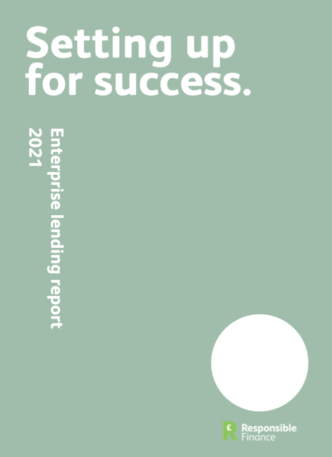Filling a gap, fuelling thousands of businesses: report shows 12,640 jobs protected by financial superpower
Thousands of jobs and businesses have the UK’s “financial superpower” to thank for lending where banks could not, according to new figures released today (14 May 2021) by Responsible Finance.
Our member Community Development Finance Institutions supported nearly 6,000 businesses and over 12,000 jobs in recent months, unlocking business growth and job creation, enabling social enterprises to continue delivering vital public services, and keeping viable firms afloat as they responded to the challenges of 2020.
The locally-based, not-for-profit providers lent £263 million to 5,887 businesses and social enterprises rejected by or unable to access finance from mainstream lenders, before and during the pandemic. They also played a critical role getting finance through Government Covid support schemes to areas it was most needed.
And with millions of viable and credit-worthy businesses, especially micro-enterprises and businesses led by female and ethnic minority entrepreneurs, unable to access investment elsewhere, Community Development Finance has been endorsed by politicians across party boundaries for its extraordinary impact.
 Figures published today in Setting Up for Success, our 2021 Enterprise Lending Report, show that between April 2019 and December 2020, Community Development Finance Institutions lent £263m to 5,887 businesses, social enterprises and start-ups, creating or protecting 12,640 jobs (further breakdown below).
Figures published today in Setting Up for Success, our 2021 Enterprise Lending Report, show that between April 2019 and December 2020, Community Development Finance Institutions lent £263m to 5,887 businesses, social enterprises and start-ups, creating or protecting 12,640 jobs (further breakdown below).
Theodora Hadjimichael, Chief Executive of Responsible Finance, said,
“The UK finance system has a superpower: community development finance institutions. As talent-spotters they help new businesses to spring up, social enterprises to step up, and SMEs to stand up – and they continue to work where banks cannot because of their local-understanding and relationship-based approach.
“With fuel from responsible finance, thousands of businesses and social enterprises have been able to withstand challenges thrown at them by the pandemic, innovate, flourish and grow.
“Yet still too many businesses and social enterprises can’t access affordable finance because they don’t fit mainstream banks’ lending profiles. We must continue to scale up community development finance so more businesses, social enterprises and people can access appropriate and ethical options, especially in places starved of investment. To recover, level-up the UK and create real opportunities, community development finance is needed now more than ever.”
Paul Scully, Minister for Small Business, said “I value the work that CDFIs do around the country – the core value of CDFIs is their focus on the customer as a person, understanding their circumstances and supporting their potential.”
Pat McFadden, Labour MP for Wolverhampton South East, said “as we try to recover from Covid we need all parts of the financial system firing on all cylinders and I believe CDFIs have a really important part to play.”
Baroness Susan Kramer, a Liberal Democrat Peer, said “I’m a passionate supporter of CDFIs, only they can understand local issues in such a way as they enable community development.”
And Danny Kruger, MP for Devizes, said, “We need lenders whose interests align with those of the community as a whole…CDFIs are more flexible, don’t have blanket lending policies and can apply real human judgement to the decisions they make about lending. After 2008 the credit crunch meant lending to small and medium sized enterprises and social enterprises really contracted and we’ve got to avoid that happening in the aftermath of Covid. We’ve got some brilliant providers in this country and I hope the Government and capital system will get behind them.”
The new report includes data from CDFIs working in communities across the UK. It reveals that of the £263m they lent to 5,887 businesses, social enterprises and start-ups:
• £115m was lent to 1,900 SMEs (small and medium sizes enterprises) which created and safeguarded 8,962 jobs
• 19 out of 20 of these loans were to businesses with less than 49 employees
• Nearly 6 out of 10 the businesses CDFIs lend to were more than 4 years old
• Examples range from The Climbing Hangar, a small independent chain of indoor climbing walls with over 100 employees which used a £496,000 loan to expand its facilities, through to one-person businesses borrowing just £3,000 (the average SME loan size was £61,400)
Social Enterprise Lending:
• £109m was lent to 668 social enterprises like YMCA Cornwall, which used loan finance to convert derelict buildings into affordable homes for young people
• 49% of this social investment from CDFIs was to female-led social enterprises
Start-Up Lending:
• £39m was lent to 3,351 start-ups like hair salon, The Only Way is S66, started by a mother and daughter and which now employs five people
• 39% was to female-led start-ups
The full report includes comprehensive data on loan characteristics, more about CDFIs’ role punching above their weight to deliver over £60m of CBILS loans, and a wide range of case studies from businesses, social enterprises and start-ups.
It also calls for further investment into CDFIs so they can address more of the enormous unmet demand for affordable finance from viable but excluded businesses, calling for additional use of a little-known but highly effective incentive, Community Investment Tax Relief.
It is published today here.
